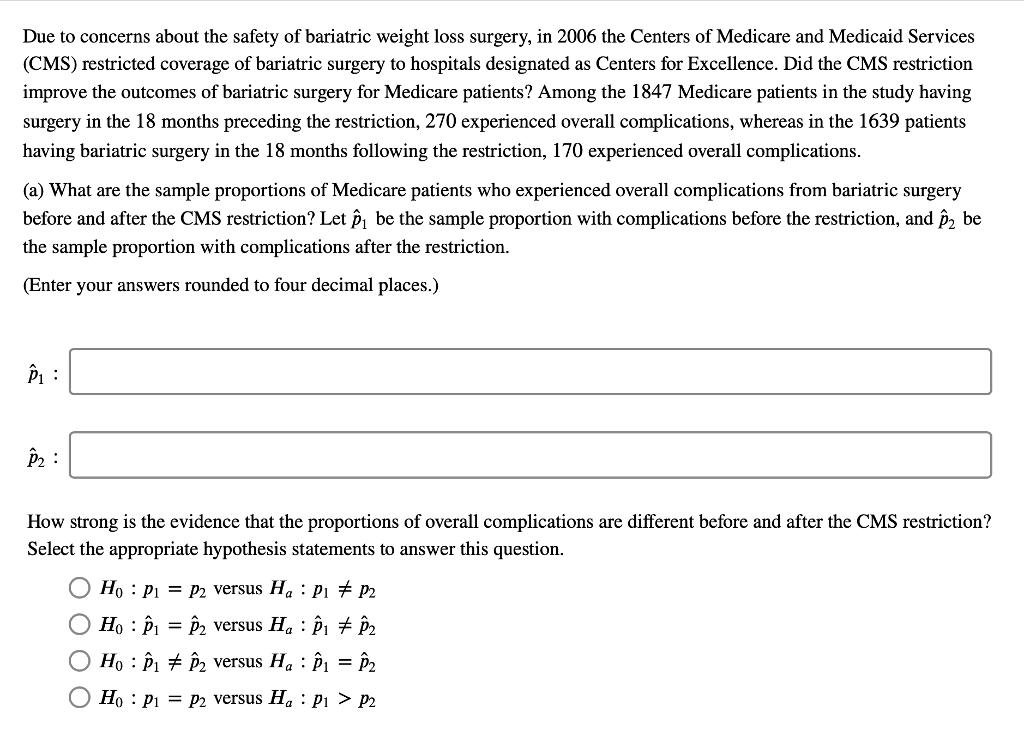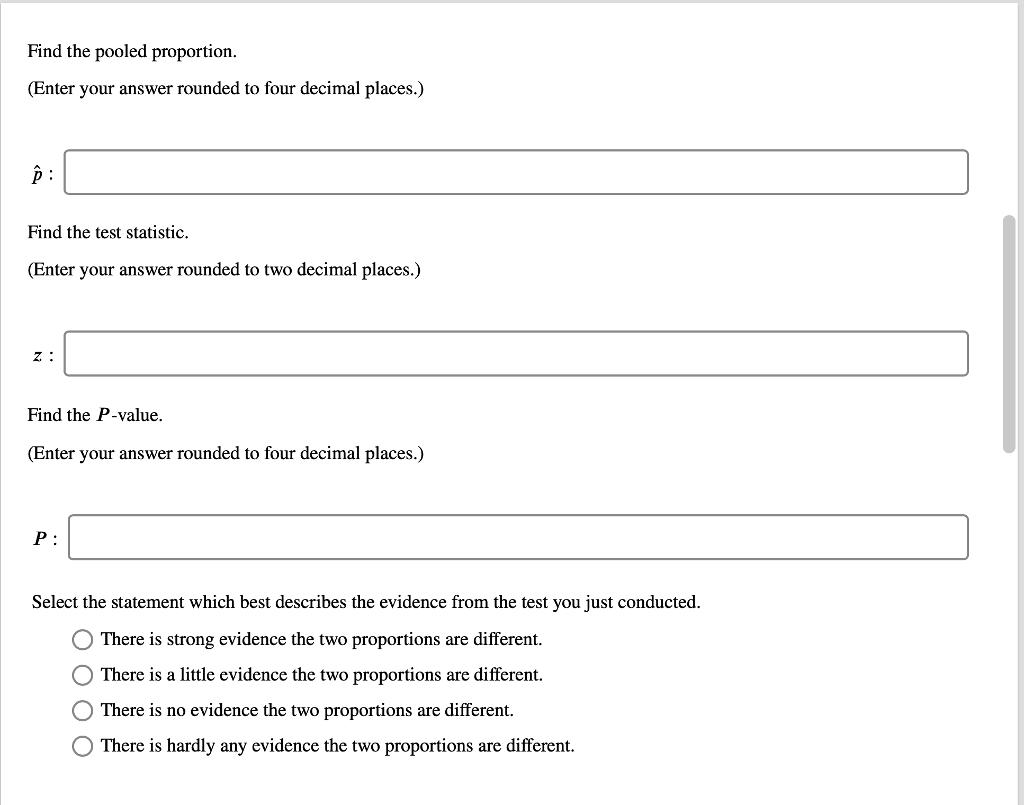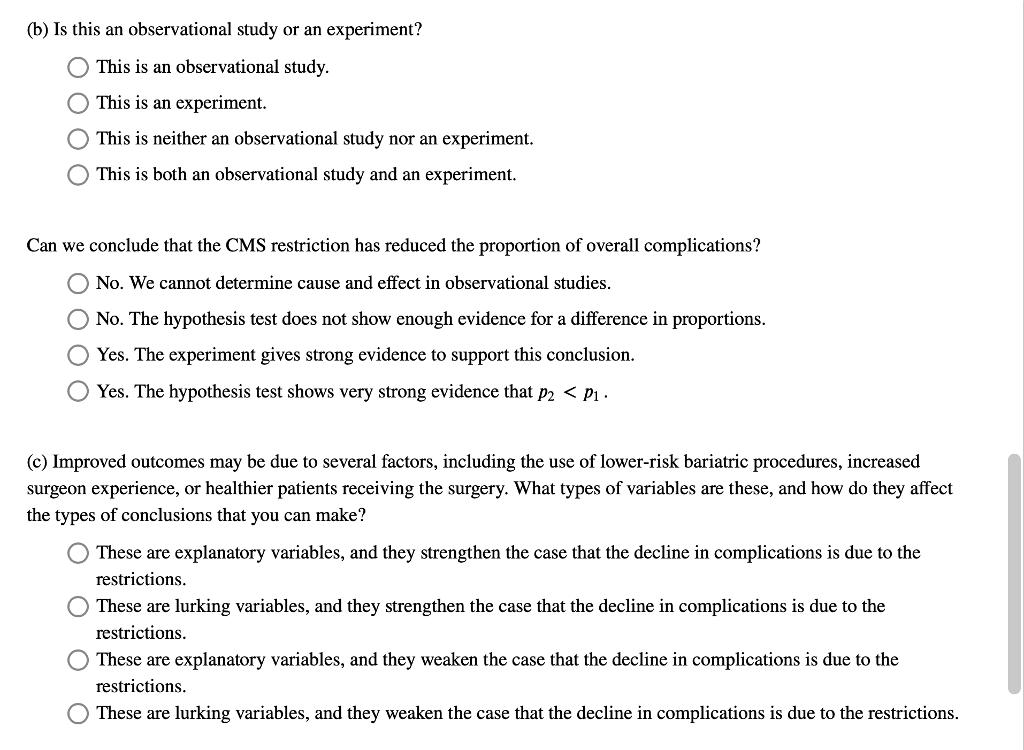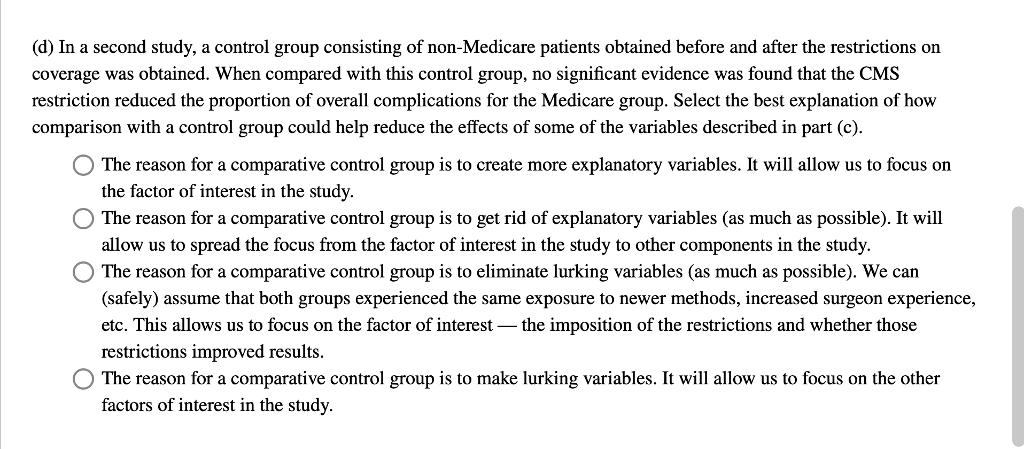Answered step by step
Verified Expert Solution
Question
1 Approved Answer
Due to concerns about the safety of bariatric weight loss surgery, in 2006 the Centers of Medicare and Medicaid Services (CMS) restricted coverage of




Due to concerns about the safety of bariatric weight loss surgery, in 2006 the Centers of Medicare and Medicaid Services (CMS) restricted coverage of bariatric surgery to hospitals designated as Centers for Excellence. Did the CMS restriction improve the outcomes of bariatric surgery for Medicare patients? Among the 1847 Medicare patients in the study having surgery in the 18 months preceding the restriction, 270 experienced overall complications, whereas in the 1639 patients having bariatric surgery in the 18 months following the restriction, 170 experienced overall complications. (a) What are the sample proportions of Medicare patients who experienced overall complications from bariatric surgery before and after the CMS restriction? Let P be the sample proportion with complications before the restriction, and p be the sample proportion with complications after the restriction. (Enter your answers rounded to four decimal places.) P : P : How strong is the evidence that the proportions of overall complications are different before and after the CMS restriction? Select the appropriate hypothesis statements to answer this question. Ho P = P2 versus H P P2 O Ho: P1 = P versus Ha P1 P Ho P1 P versus H P = P2 : Ho P1 P2 versus Ha: P1 > P2 Find the pooled proportion. (Enter your answer rounded to four decimal places.) p: Find the test statistic. (Enter your answer rounded to two decimal places.) Z: Find the P-value. (Enter your answer rounded to four decimal places.) P: Select the statement which best describes the evidence from the test you just conducted. There is strong evidence the two proportions are different. There is a little evidence the two proportions are different. O There is no evidence the two proportions are different. There is hardly any evidence the two proportions are different. (b) Is this an observational study or an experiment? O This is an observational study. O This is an experiment. O This is neither an observational study nor an experiment. This is both an observational study and an experiment. Can we conclude that the CMS restriction has reduced the proportion of overall complications? O No. We cannot determine cause and effect in observational studies. O No. The hypothesis test does not show enough evidence for a difference in proportions. O Yes. The experiment gives strong evidence to support this conclusion. O Yes. The hypothesis test shows very strong evidence that p2 < P1. outc (c) Imp may be due to several factors, including the use of lower-risk bariatric procedures, increased surgeon experience, or healthier patients receiving the surgery. What types of variables are these, and how do they affect the types of conclusions that you can make? These are explanatory variables, and they strengthen the case that the decline in complications is due to the restrictions. O These are lurking variables, and they strengthen the case that the decline in complications is due to the restrictions. O These are explanatory variables, and they weaken the case that the decline in complications is due to the restrictions. These are lurking variables, and they weaken the case that the decline in complications is due to the restrictions. (d) In a second study, a control group consisting of non-Medicare patients obtained before and after the restrictions on coverage was obtained. When compared with this control group, no significant evidence was found that the CMS restriction reduced the proportion of overall complications for the Medicare group. Select the best explanation of how comparison with a control group could help reduce the effects of some of the variables described in part (c). The reason for a comparative control group is to create more explanatory variables. It will allow us to focus on the factor of interest in the study. The reason for a comparative control group is to get rid of explanatory variables (as much as possible). It will allow us to spread the focus from the factor of interest in the study to other components in the study. O The reason for a comparative control group is to eliminate lurking variables (as much as possible). We can (safely) assume that both groups experienced the same exposure to newer methods, increased surgeon experience, etc. This allows us to focus on the factor of interest - the imposition of the restrictions and whether those restrictions improved results. The reason for a comparative control group is to make lurking variables. It will allow us to focus on the other factors of interest in the study.
Step by Step Solution
★★★★★
3.45 Rating (155 Votes )
There are 3 Steps involved in it
Step: 1

Get Instant Access to Expert-Tailored Solutions
See step-by-step solutions with expert insights and AI powered tools for academic success
Step: 2

Step: 3

Ace Your Homework with AI
Get the answers you need in no time with our AI-driven, step-by-step assistance
Get Started


